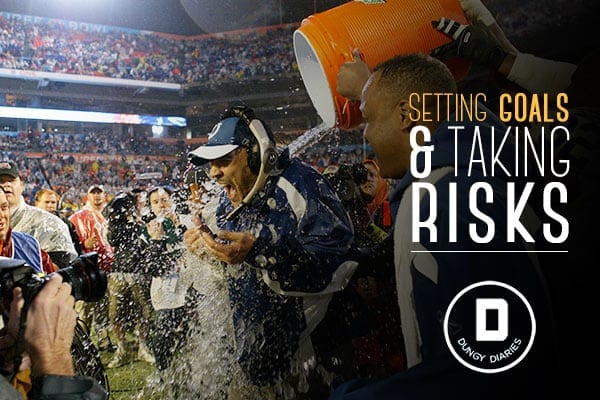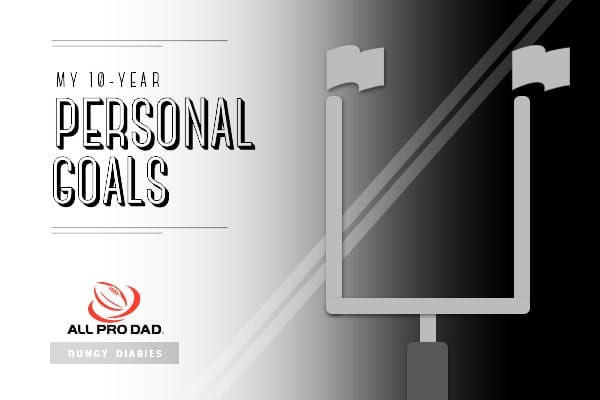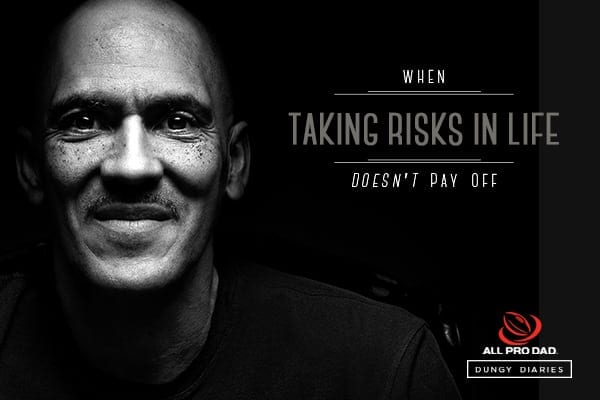Matt Emmons is a world-champion marksman. In the 2004 Summer Olympics in Athens, Greece, he had a significant lead when he entered the final round of the 50-meter, three position rifle competition. He hit the bull’s-eye on his three shots, then looked on, puzzled, as the automatic scoring system did not credit his shots. He called the judge over, and the target was pulled in to ascertain just what had occurred. It was untouched. No holes.
The target in the next lane, however, had three extra holes—holes made by Matt’s shots. His mistake cost him in the standings, and he finished eighth. This story illustrates my point that without a goal—your own goal, not someone else’s—you won’t reach all that you’re capable of. Unless you are focused on the passions of your heart and are striving toward them, you won’t achieve all that God has in store for you.
Of course, life isn’t neat and tidy, and the story doesn’t end there. Competitor Katerina Kurkova of the Czech Republic made it a point to introduce herself and offer her condolences to Matt, the American shooter who had just made such a huge blunder. Less than three years later, they were married. You never know what God has in store for you, even from your disappointments. Here’s how I set goals and think about taking risks.
Setting Goals
My goals are usually qualitative rather than quantitative. I never aimed for a particular number of games to win, but rather for a team that is as good as it can be and guys who are an asset to the community and good role models. Those are the things I reflected on at the end of each year as I analyzed our season. I measured our teams by how we performed compared to our potential—that’s really the only reasonable measurement to use.
As for me personally, I try to improve each year. When I was a young assistant, my goal was to learn enough to be a good defensive coach and to help my players play as well as possible. Later, it was to continue to learn and improve, so that I might merit consideration as a defensive coordinator. Still later, it was to put myself in a position to someday become a head coach.
Take note, however. Though I wanted to be a coordinator and head coach, I continued to focus on a goal that was within my control: to continually hone my coaching abilities in order to be ready for those positions. I couldn’t control whether or not I was hired. Some things are up to others—and God—and therefore aren’t realistic to hold over yourself.
Taking Risks
Sometimes, those goals require risk. The old saying that “you can’t steal second with your foot still on first” is true not only in baseball but also in life. When Herm Edwards left my staff in Tampa Bay to become the head coach of the New York Jets, I was forced to replace a terrific coach. Fortunately, given our success and the fact that it was one of only thirty-two NFL positions, the applicants were many.
I hired Mike Tomlin, a young—very young—coach out of the University of Cincinnati. Mike had been at the university for only two years, but I hired him because I loved what I saw: a teacher with a high energy level. Some people may have thought of this as taking a chance because I was replacing a highly respected veteran NFL coach with someone who had no NFL experience.
Mike was the one who took a bigger risk, however. He had been safe in Cincinnati, secure in his current coaching position. Yet he decided to step out of his comfort zone to join a staff that was undergoing transition, a club in which rumors were circulating as to whether any of us would keep our jobs if we didn’t go to the Super Bowl. By coming with us, Mike could have very easily been out of a job the following season. Though many would think that coming to the Buccaneers from the University of Cincinnati was a no-brainer, Mike had to consider his options and take a chance.
That rise paid off. I did get fired after that season, but Mike stayed on with Tampa for four more seasons; then he joined Minnesota for one year as their defensive coordinator. Seven years after his decision not to play it safe, Mike was named the head coach of the Pittsburgh Steelers.
Sometimes, taking a risk doesn’t necessarily pay off. When it was time for me to leave the Steelers in 1988, Lauren and I really agonized over our options. I was offered jobs by two coaches who ended up in the Hall of Fame, both in the same off-season: Bill Parcells of the Giants and Bill Walsh of the 49ers. I also had good interviews with Same Wyche in Cincinnati and Marty Schottenheimer in Kansas City. All four men were great coaches and good people. I had played for Bill Walsh and Same Wyche when I was in San Francisco, and I knew I could be comfortable with either. Of course, Bill Parcells had recently won his first Super Bowl, and my interview with him was a defensive coach’s dream: sitting in an office, talking football theory with Bill and his staff—Bill Belichick and Romeo Crennel.
However, Lauren and I were in the process of starting a family, and we decided that the cities of New York and San Francisco were more than we wanted to undertake. I didn’t get offered the job in Cincinnati, so we ended up with Marty Schottenheimer in Kansas City.
The quality of life in Kansas City was great, and it was a perfect place to start raising children. But after three years with the Chiefs, I felt I need to move on, for reasons that were more persona than professional. In the meantime, the Giants and 49ers had each won a Super Bowl. It would have been easy to second-guess my decision, but there really is no safe path through life. We make decisions with the best information we have, which often makes it seem like we’re in a fog. (This can feel especially true during games.)
What I’ve learned is to gather as much information as possible at the time, pray about things, make a decision, and move on. Certainly, I learn from my decisions and the consequences so I don’t repeat mistakes in the future, but I don’t second-guess choices I’ve already made. It isn’t productive. Even though we didn’t win a Super Bowl in Kansas City, many of the things I learned and many of the relationships I made are still benefiting me today.
Unless you get a second chance to undo those decisions, it’s best to press on and give yourself a break, while doing the best you can with where you are. Some of your decisions will pan out; some will be disasters. One great life lesson I’ve learned from sports is that no one wins every game. And we can win championships even after losing some games. Either way, we’ve won in my book, because we stepped out of the illusion of safety and security and are fully active in the game of life.











